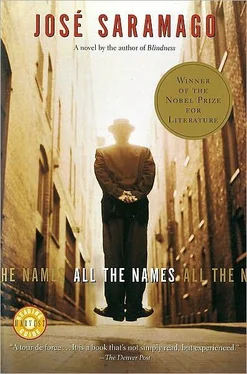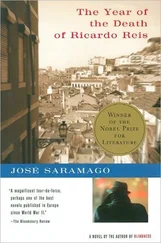That night, Senhor José returned to the Central Registry. He took with him the flashlight and a hundred-yard roll of strong string. He had put a new battery in his flashlight that would suffice for several hours of continual use, but, more than chastened by the difficulties he had been obliged to confront during the dangerous break-in and theft at the school, Senhor José had learned that in life you can never be too careful, especially when you abandon the straight paths of honest behaviour and wander off down the tortuous shortcuts of crime. What if the little bulb were to blow, what if the lens that protects and intensifies the light were to come loose from the casing, what if the flashlight, with the battery lens and bulb intact, were to fall down a hole so that he couldn't reach it with his arm or even with a hook, then, not daring to use the real Ariadne's thread, despite the fact that the drawer in the Registrar's Office where it was kept, along with a powerful flashlight, was never locked, Senhor José will instead use an ordinary, rustic ball of string bought at the hardware store, and that string will lead back to the world of the living the person who, at this very moment, is preparing to enter the kingdom of the dead. As a member of the Central Registry, Senhor José has legitimate access to any documents in the civil register, which are, need we repeat, the very substance of his work, so some may think it strange that, when he found the card missing, he did not simply say to the senior clerk he worked under, I'm going to look for the card of a woman who died. For it would not be enough just to say that, he would have to give a reason that was both administratively sound and bureaucratically logical, the senior clerk would be bound to ask, What do you want it for, and Senhor José could hardly reply, To be quite sure that she's really dead, what would happen to the Central Registry if everyone started satisfying the same or similar curiosities, which were not only morbid but unproductive too. The worst that could come of Senhor José's nocturnal expedition would be that he would be unable to find the unknown woman's papers in the chaos that is the archive of the dead. Of course, at first, since we're dealing with a recent death, the papers should be at what was commonly termed the entrance, which is immediately problematic because of the impossibility of knowing exactly where the entrance to the archive of the dead is. It would be too simple to say, as do some stubborn optimists, that the space designated for the dead obviously begins where the space for the living ends, and vice versa, perhaps adding that, in the outside world, things are arranged in a similar fashion, given that, apart from exceptional events, albeit not that exceptional, such as natural disasters or wars, you don't normally see the dead mingling in the street with the living. Now, for both structural and non-structural reasons, this can in fact happen in the Central Registry. It and it does. As we have already explained from time to time when the congestion caused by the continual and irresistible accumulation of the dead begins to block the path of staff along the corridors and consequently to obstruct any documentary research they have no option but to demolish the wall at the rear and rebuild it a few yards farther back However through an involuntary oversight on our part we failed to mention the two perverse effects of this congestion. First while the wall is being built it is inevitable that for lack of a space of their own at the back of the building the cards and files of the recently dead come dangerously close to, and, on the near side, even touch the files of the living, which are to be found on the far end of their respective shelves, giving rise to an embarrassing fringe of confusion between those who are still living and those who are now dead. Second, once the wall has been built and the roof extended, and the filing away of the dead can at last return to normality, that same border conflict, as it were, will prevent, or, at the very least, prove extremely prejudicial to, the transport into the outer darkness of the dead intruders, if you'll pardon the expression. Added to these far from minor inconveniences is the fact that, without the knowledge of the Registrar or their colleagues, the two youngest clerks have no qualms, either because they have not been properly trained or because of a grave deficiency in their personal ethics, about simply sticking a dead person anywhere, without going to the trouble of seeing if there might be space inside the archive of the dead. If luck were not on Senhor José's side this time, if chance did not favour him, the adventure of breaking into the school, however risky, will have been child's play compared to what awaits him here.
One might ask why Senhor José needs a hundred-yard-long piece of string if the length of the Central Registry, despite successive extensions, is no more than eighty. That is the question of a person who imagines that one can do everything in life simply by following a straight line, that it is always possible to proceed from one place to another by the shortest route, perhaps some people in the outside world believe that they have done so, but here, where the living and the dead share the same space, sometimes, in order to find one of them, you have to make a lot of twists and turns, you have to skirt round mountains of bundles, columns of files, piles of cards, thickets of ancient remains, you have to walk down dark gulleys, between walls of grubby paper which, up above, actually touch, yards and yards of string will have to be unravelled, left behind, like a sinuous, subtle trail traced in the dust, there is no other way of knowing where you have to go next, there is no other way of finding your way back. Senhor José tied one end of the string to the leg of the Registrar's desk, not out of any lack of respect, but merely to gain a few yards, then tied the other end to his ankle, and, placing on the floor the ball of string, which unravelled with each step he took, he set off along one of the central corridors filled by the files of the living. His plan is to start his search at the far end, where the unknown woman's file and card should be, even though, for reasons already explained, it is highly unlikely that they will have been filed away correctly. As Senhor José is a civil servant from another age, trained in the old methods and disciplines, his strict character would be repelled by any collusion with the irresponsible habits of the new generation, by beginning the search in a place where a dead person would have been deposited only by a deliberate and scandalous infraction of basic archivistic rules. He knows that the main difficulty he is going to have to do battle with is the lack of light. Apart from the Registrar's desk, above which hangs the inevitable lamp giving off its usual dull light, the whole of the Central Registry is plunged in darkness, in dense shadows. Turning on other fights in the building, however dim they might be, would be too risky, a keen policeman doing his rounds of the area, or a good citizen, the sort who is concerned about the safety of the community, might spot the diffuse light through the high windows and immediately sound the alarm. Senhor José will, therefore, have only the feeble circle of light, which wavers before him in time to the rhythm of his steps, but also because the hand holding the flashlight is trembling. There is an enormous difference between visiting the archive of the dead in normal working hours, with the presence behind you of your colleagues who although not particularly supportive as we have seen, would always come running if there were any real danger or if your nerve suddenly, irresistibly failed, especially if the Registrar said, Go and see what's happened to him, between that and venturing alone, in the middle of a black night, into the heart of those catacombs of humanity, surrounded by names, hearing the whisper of the papers, or a murmur of voices, for those who have ears to hear.
Читать дальше












